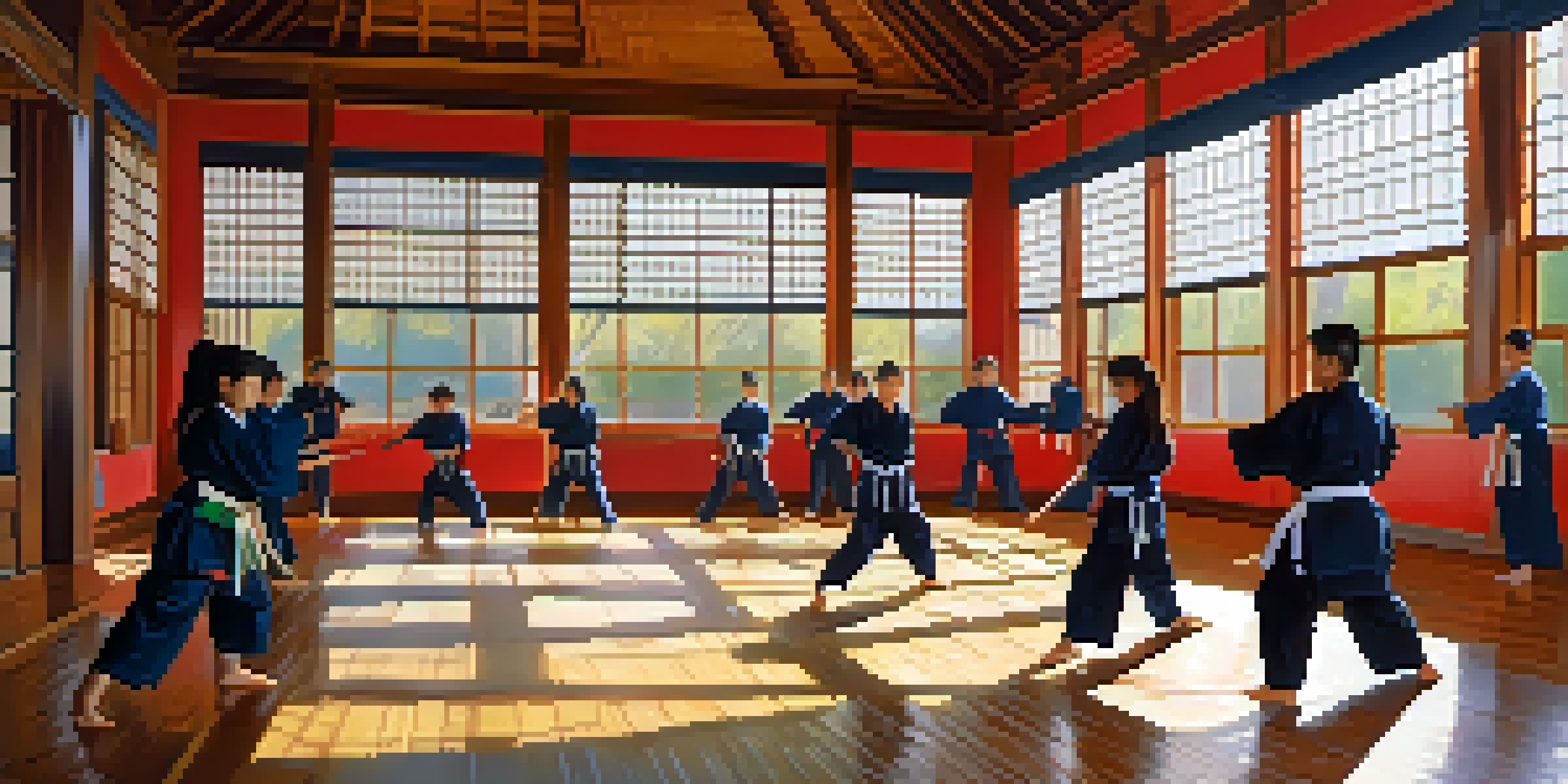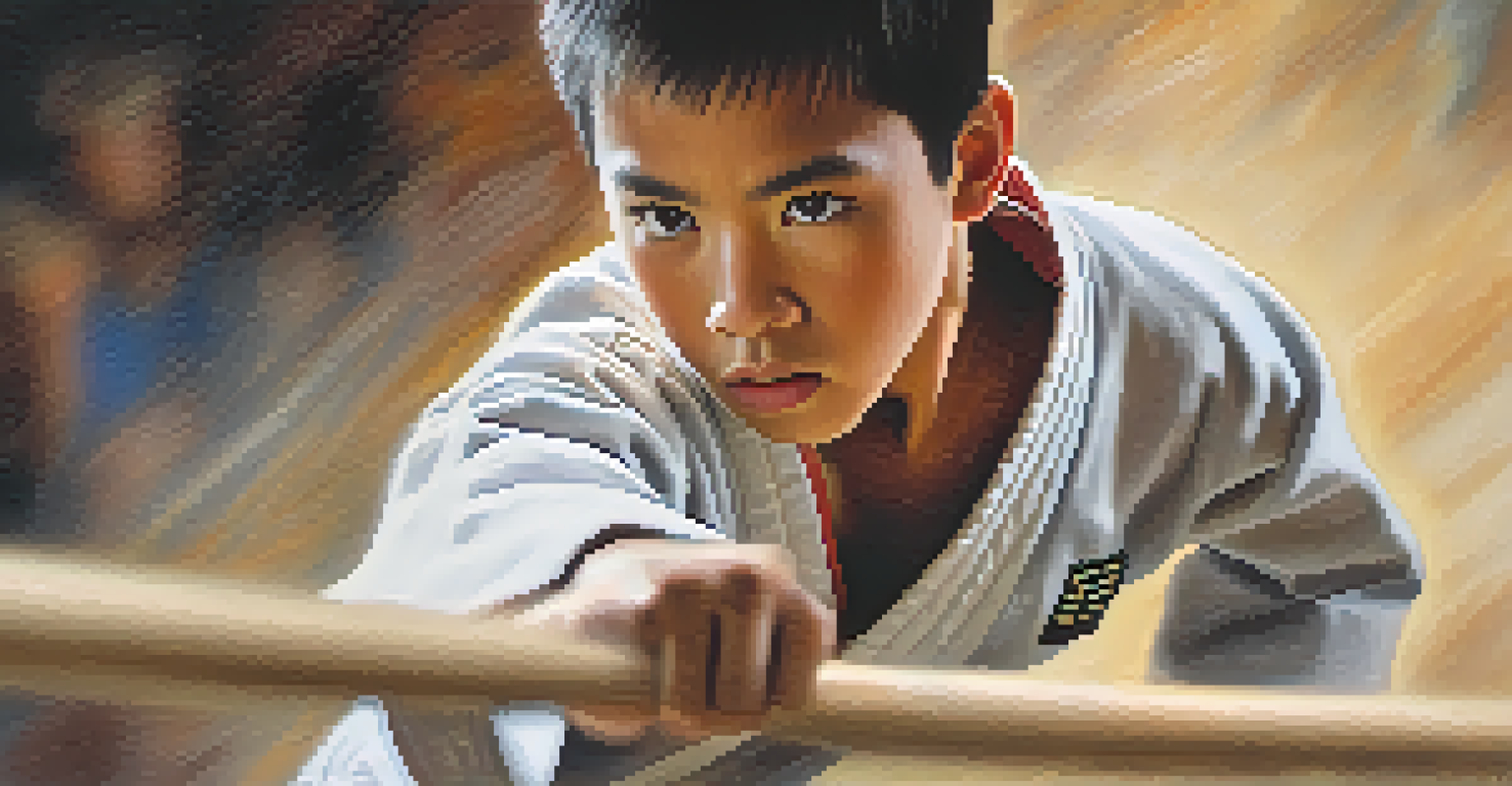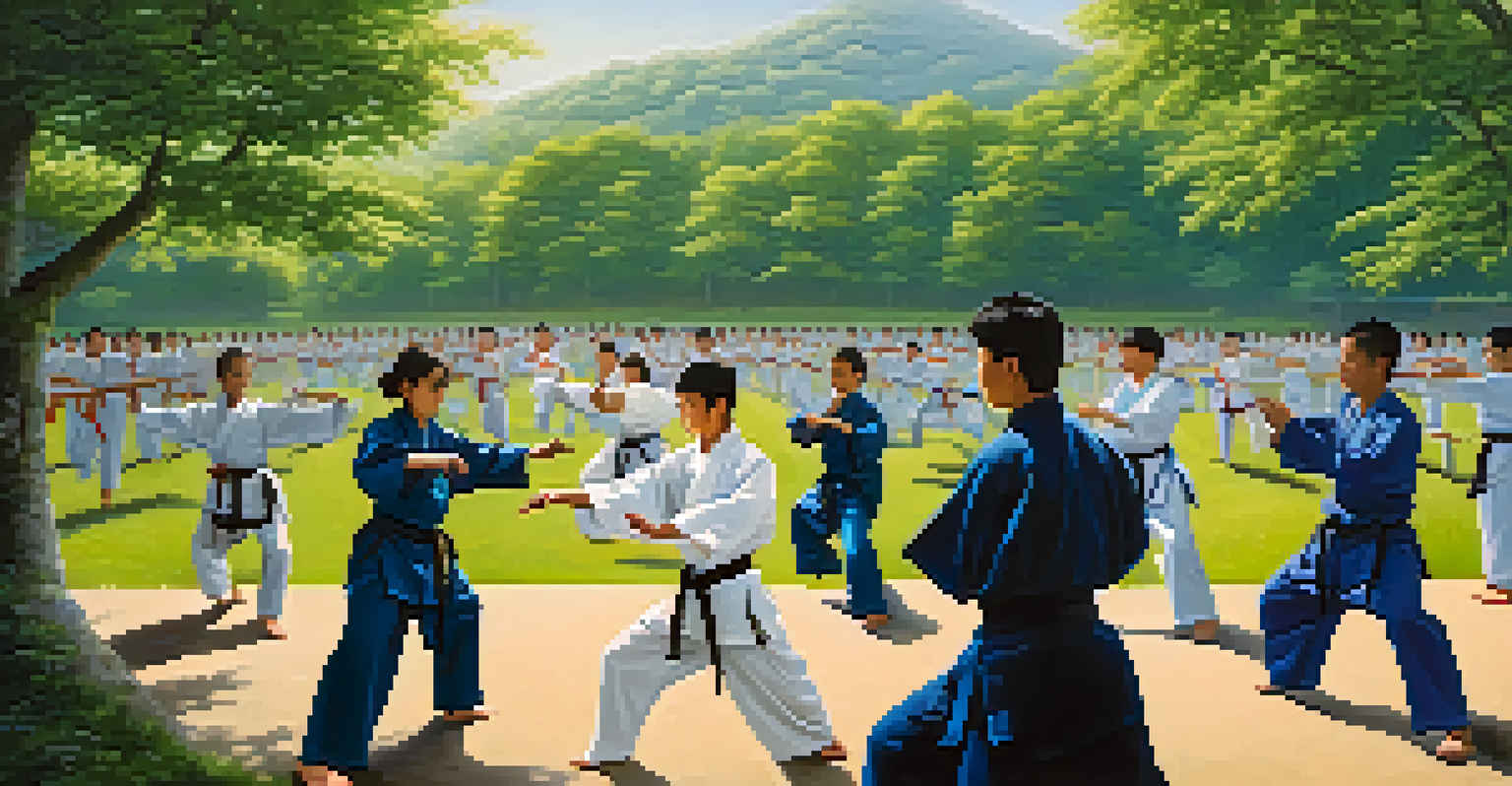Benefits of Martial Arts Training for Student Physical Fitness

Martial Arts: A Fun Way to Stay Active and Fit
Martial arts training offers a unique and enjoyable way for students to engage in physical activity. Unlike traditional workouts, martial arts combines exercise with skill development and self-discipline, making it more appealing to many young people. This fun element helps students stay committed to their fitness journey and encourages them to participate regularly.
The more you sweat in training, the less you bleed in battle.
Moreover, martial arts classes often incorporate games and drills that keep the atmosphere light and engaging. This playful environment fosters a sense of community among peers, which can motivate students to push themselves further. As a result, they not only improve their physical fitness but also build lasting friendships.
Overall, the dynamic and enjoyable nature of martial arts can inspire a lifelong passion for fitness, helping students develop healthy habits that extend beyond the dojo.
Enhanced Strength and Endurance Through Training
One of the most noticeable benefits of martial arts training is the improvement in strength and endurance. Practicing techniques and routines requires students to use various muscle groups, leading to a balanced and toned physique. As they progress, they often find themselves developing greater stamina, allowing them to perform better in other physical activities.

For instance, the repetitive movements involved in martial arts can significantly enhance cardiovascular fitness, making everyday tasks feel easier. As students train consistently, they build the muscle strength necessary to execute powerful kicks and punches, all while improving their overall agility and flexibility.
Martial Arts Boosts Physical Fitness
Training in martial arts improves strength, endurance, coordination, and balance, leading to a well-rounded fitness experience.
This increase in strength and endurance not only contributes to better performance in martial arts but also translates to improved athleticism in sports and other physical activities.
Improved Coordination and Balance Skills
Martial arts training is an excellent way to develop coordination and balance, both essential components of physical fitness. As students learn various techniques, they become more aware of their body movements and how to control them effectively. This heightened awareness translates into better overall body coordination.
Martial arts are ultimately self-improvement.
For example, mastering a roundhouse kick requires precise timing, balance, and control, which can significantly enhance a student's motor skills. Improved coordination can also lead to better performance in other sports, as athletes rely on similar skills to excel in their chosen activities.
Ultimately, the coordination and balance gained from martial arts training can contribute to a student's success both on and off the mat.
Boosting Self-Discipline and Focus in Students
Martial arts training is not just about physical fitness; it also instills valuable life skills like self-discipline and focus. Students learn to set goals, follow instructions, and push through challenges, which fosters a strong sense of determination. This self-discipline can positively impact their academic performance as well.
As students progress through the ranks, they experience the importance of hard work and dedication. The process of earning belts or rankings encourages them to stay committed and focused on their training. This focus can translate into better study habits and improved concentration in school.
Develops Life Skills and Confidence
Martial arts instills self-discipline, focus, and confidence in students, helping them succeed in various aspects of life.
In essence, martial arts training teaches students that dedication and perseverance lead to success, both on the mat and in their everyday lives.
Building Confidence Through Skill Mastery
Another significant benefit of martial arts training is the boost in self-confidence that comes from mastering new skills. As students learn and practice various techniques, they gradually become more proficient, which can greatly enhance their self-esteem. This newfound confidence often spills over into other areas of their lives, including academics and social interactions.
For example, successfully breaking a board or earning a new belt can provide a tremendous sense of accomplishment. These achievements serve as reminders that hard work pays off, reinforcing the idea that they can overcome obstacles both in martial arts and beyond.
Ultimately, martial arts training empowers students to believe in themselves, encouraging them to take on new challenges with a positive mindset.
Stress Relief and Mental Wellness Benefits
Martial arts training can be an effective way for students to manage stress and promote mental wellness. The physical activity involved helps release endorphins, which are natural mood lifters, making students feel more relaxed and centered. This aspect of martial arts provides a healthy outlet for the pressures they may face in school and daily life.
In addition, the focus required during training sessions encourages mindfulness, helping students to stay present and alleviate anxiety. As they concentrate on their movements and techniques, they can temporarily escape from their worries and frustrations.
Fosters Social Connections and Teamwork
Participating in group martial arts classes enhances social skills and teamwork, building camaraderie and support among peers.
In this way, martial arts not only contributes to physical fitness but also serves as a valuable tool for mental health and emotional well-being.
Social Skills and Teamwork Development
Martial arts training often takes place in a group setting, providing students with opportunities to develop essential social skills and teamwork. Interacting with peers during classes fosters communication, respect, and cooperation, all of which are crucial for building healthy relationships. This social aspect can be particularly beneficial for shy or introverted students.
Working together in partner drills or sparring exercises encourages students to support and motivate each other, creating a sense of camaraderie within the dojo. As they learn to navigate challenges together, they also develop resilience and adaptability, essential traits for success in life.

In essence, martial arts training not only enhances physical fitness but also equips students with valuable interpersonal skills that will serve them well beyond the mat.
Creating Lifelong Healthy Habits and Routines
Participating in martial arts can help students establish lifelong healthy habits and routines. The structured nature of classes encourages regular practice and commitment, instilling discipline that can carry over into other areas of their lives. As students become accustomed to prioritizing physical activity, they are more likely to continue these habits as they grow older.
Moreover, martial arts training often emphasizes the importance of nutrition and overall well-being, reinforcing the idea that a healthy lifestyle is a holistic endeavor. Students learn that fitness is not just about exercise but also about taking care of their bodies through proper nutrition and self-care.
Ultimately, the skills and habits developed through martial arts training can lead to a lifetime of health and wellness, empowering students to maintain their physical fitness as they transition into adulthood.